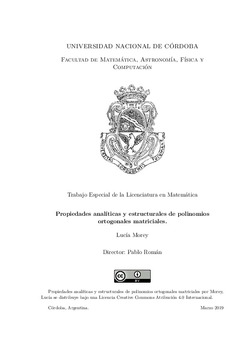| dc.contributor.advisor | Román, Pablo Manuel, dir. | |
| dc.contributor.author | Morey, Lucía | |
| dc.date.accessioned | 2019-08-30T13:19:43Z | |
| dc.date.available | 2019-08-30T13:19:43Z | |
| dc.date.issued | 2019-03 | |
| dc.identifier.uri | http://hdl.handle.net/11086/12696 | |
| dc.description | Tesis (Lic. en Matemática)--Universidad Nacional de Córdoba, Facultad de Matemática, Astronomía, Física y Computación, 2019. | es |
| dc.description.abstract | La teoría de polinomios ortogonales matriciales fue introducida por Krein en la década de 1940 y, desde entonces, ha sido estudiada en distintos contextos. Desde un punto de vista analítico, en los últimos años se ha hecho un gran esfuerzo en encontrar clases de polinomios ortogonales matriciales con propiedades similares a las de Familias Clásicas. En este trabajo, a partir de una ecuación matricial de Pearson discreta, encontramos condiciones generales para la existencia de lowering y raising operators para polinomios matriciales ortogonales con respecto a una medida discreta. En particular, estos operadores permiten obtener de forma natural una fórmula de Rodrigues matricial y un operador en diferencias de segundo orden que tiene a los polinomios ortogonales como autofunciones. Además, damos una familia matricial de tipo Charlier de dimensión arbitraria que satisface la ecuación de Pearson discreta | es |
| dc.description.abstract | The theory of matrix-valued orthogonal polynomials was introduced by Krein in the 1940’s and, since then, has been studied in different contexts. From an analytical point of view, in the last few years there was an effort to find families of matrix-valued orthogonal polynomials that satisfy similar properties as the Classical Families. In this work, starting from a discrete Pearson equation, we find general conditions for the existence of lowering and raising operators for matrix-valued orthogonal polynomials with respect to a discrete measure. In particular we use these operators to obtain, in a natural way, a Rodrigues formula and a second order difference operator having the orthogonal polynomials as eigenfunctions. Moreover, we find a family of matrix-valued Charlier-type polynomials which satisfies the discrete Pearson equation. | en |
| dc.language.iso | spa | es |
| dc.rights | Atribución 4.0 Internacional | |
| dc.rights.uri | https://creativecommons.org/licenses/by/4.0/ | |
| dc.subject | Polinomios ortogonales y funciones de tipo hipergeométricas | es |
| dc.subject | Orthogonal functions and polynomials | en |
| dc.subject | Orthogonal polynomials and functions of hypergeometric type | en |
| dc.subject.other | Polinomios ortogonales matriciales | es |
| dc.subject.other | Ecuación de Pearson | es |
| dc.subject.other | Fórmula de Rodrigues | es |
| dc.subject.other | Medidas discretas | es |
| dc.subject.other | Fórmula de estructura | es |
| dc.subject.other | Matrix valued orthogonal polynomials | en |
| dc.subject.other | Pearson equation | en |
| dc.subject.other | Rodrigues formula | en |
| dc.subject.other | Discrete measures, structure formula | en |
| dc.title | Propiedades analíticas y estructurales de polinomios ortogonales matriciales | es |
| dc.type | bachelorThesis | es |





